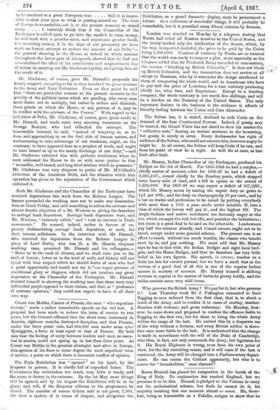Mr. Massey, Indian Chancellor of the Exchequer, produced his Budget
on the 5th of March. For 1865-1866 he had a surplus,— chiefly matter of account,—but for 1866-67 he had a deficit of 2,395,2471., caused chiefly by the Bombay panic, which stopped some heavy sales of land, and a fall in opium to the extent of 1,624,000/. For 1867-68 we may expect a deficit of 557,5221., which Mr. Massey meets by raising the export duty on grain to 40. per 501b., and the duty on champagne by 50 per cent., and by a tax on trades and professions to be raised by putting everybody with more than a 100/. a year, made under schedule D, into a class of which the lowest will pay V., and the highest 20/. The Anglo-Indians and native merchants are furiously angry at this tax, which exempts the rich but idle, and punishes the industrious ; but there is a good deal to be said on the other side. Landowners pay half the revenue already, and Consol owners ought not to be taxed, except under some general scheme. The present one is an effort to reach, without too much trouble, the classes who benefit most by us, and pay nothing. We must add that Mr. Massey says he has to deal with. the Indian Budget and eight local bud- gets, and the Home Budget, and that he therefore has very little belief in his own figures. His speech, in extenso, reaches us a little too late for careful perusal, but we have a smell that at the bottom of a good deal of all this is one of the regular Indian messes in matters of account. Mr. Massey himself is shifting revenue to capital in the matter of barracks pretty boldly, and the tables contain seine very wild items.






























 Previous page
Previous page